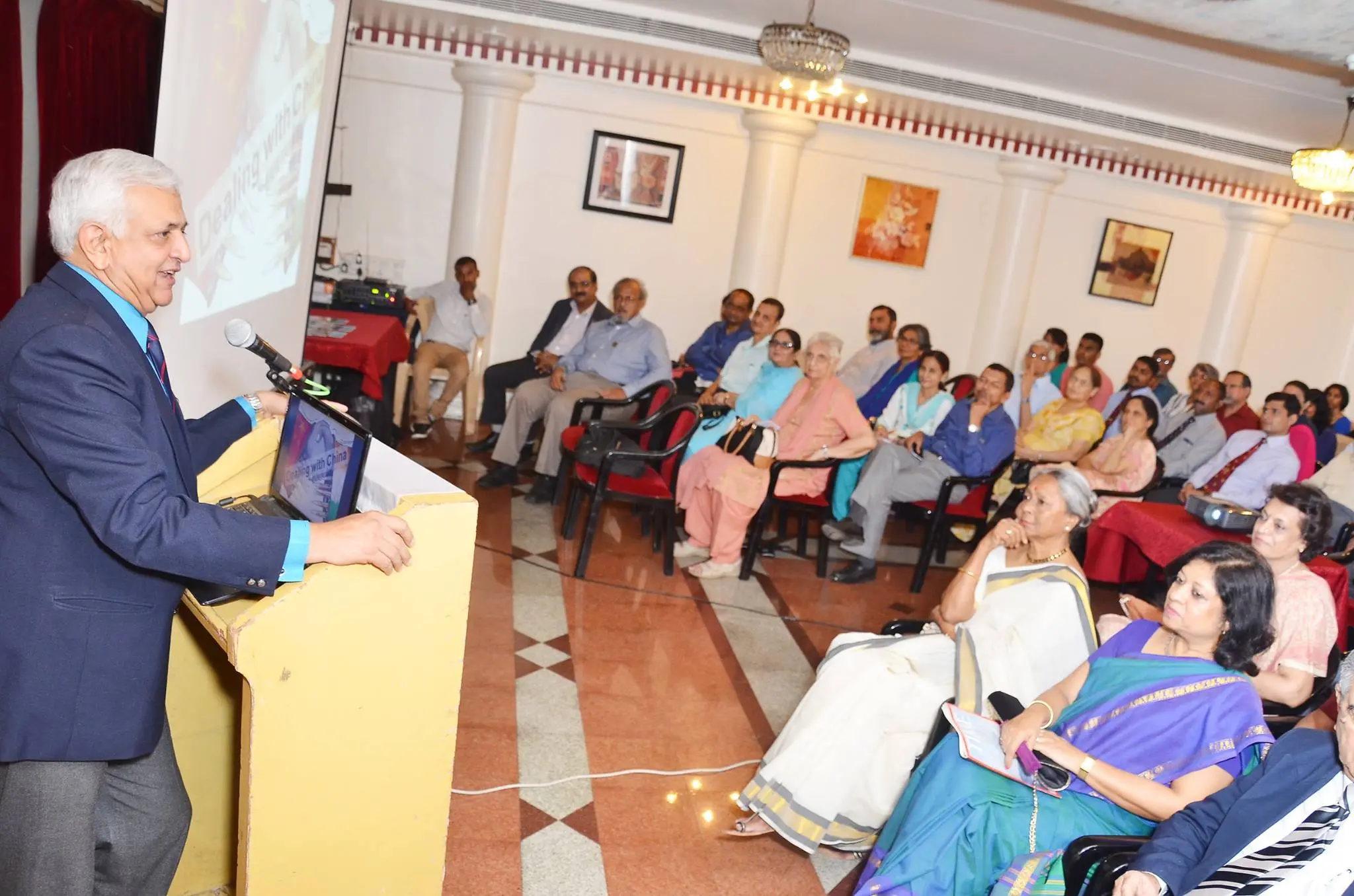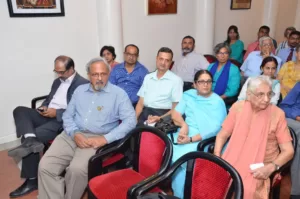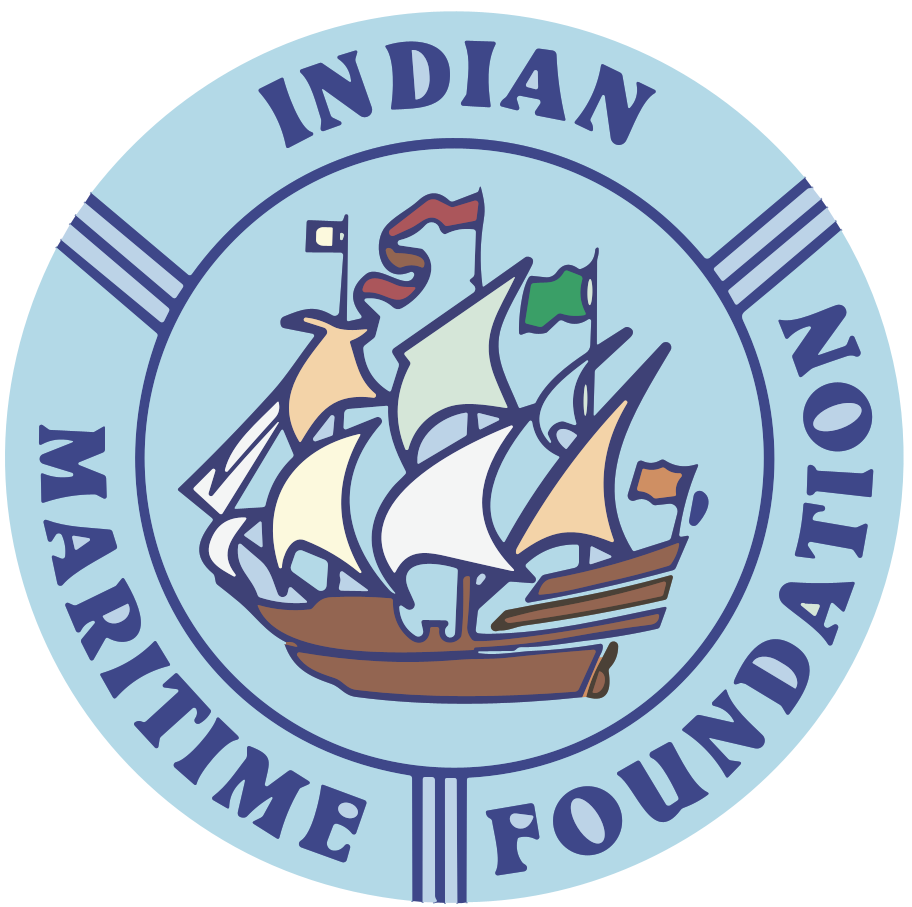
3rd Maritime Security Lecture by VAdm Pradeep Chauhan
The last lecture in the Maritime Security Trilogy was delivered by Vice Admiral Pradeep Chauhan AVSM & Bar, VSM, on the 7th of June 2016 at the Boat Club. Interest levels having been raised during the first two lectures, we had a full house for this one, with serving Naval Officers from Mumbai, Lonavala and the NDA and MILIT at Pune in the audience. Several retired and serving officers including Flag Officers from the Army, Navy and Air Force along with their ladies, and interested people from various walks of life also formed part of the Audience.
Welcome Address by Cmde Rajan Vir (Retd)
Cmde Rajan Vir, the President of IMF began the proceedings with his welcome address. In addition to introducing the speaker, he thanked the sponsors for the evening – Lt Col and Mrs Jagdish Kumar. He then briefly spoke about the IMF and how it has been playing the role of a catalyst in making the people ‘sea-minded’ through lectures, seminars, marine art exhibitions and the constant campaign against marine pollution. As a part of the latter IMF has been conducting the International Coastal Cleanup (ICC) since 2003 in collaboration with Ocean Conservancy, a Washington based group. Last year’s results had just been received, he said, and India had been placed 11th amongst 130 countries, which was indeed creditable. He also spoke about the International Ocean Day, due to be celebrated the next day (8th June). About the ongoing lecture series, he stated that there was an urgent need for the citizens of the country to understand the current security scenario as the Indian Ocean, which has become an area of interest globally. China has aspirations of being a global power, and to that end regional supremacy is essential, and India has no alternative but to take this seriously. In that light the subject of today’s lecture is very topical he said, and felt that we could not have got a better speaker than Admiral Chauhan to speak on the subject.
Talk by VAdm Pradeep Chauhan (Retd)
Admiral Chauhan began with a brief recap of the earlier two lectures, and at once put all parts of the audience at ease in his unique style of delivery, while increasing their attention levels to the highest. He began by explaining that even though the Geographical position of any country was fixed, its geographical orientation was variable, which eventually was the driver of its geostrategic policy. The other factors that were essential for any threat evaluation, he said were, Scholarship, a deep study of history and lessons drawn from historical experience, and the ability to identify and differentiate between ‘interests, ‘threats’ and ‘risks’. He then enumerated the core interests of China, which were: Regime Survival, Face, Domestic Stability, Territorial Integrity and Economic Prosperity. Conventional democracies always had economic prosperity and well being of the populace as the first and foremost interest, but therein lay the difference, he explained. He then explained the significance of the 15” Isohyet (the line joining places of equal rainfall), and how most of the prosperous regions lay towards the east, making for concentration of the manufacturing and other industries. As China’s geo-economic power impacted and dwarfed regional economies, its asserted geostrategy incorporated an increase of geophysically specific regimes as its ‘core interest’. Additionally, China’s historical self-concept of being a ‘Middle Kingdom’, provided a defining sense of National pride, he said.
Talking about China’s Military Strategy, the Admiral explained that the Military was always subservient to the political party’s command (regime survival being a leading core interest). There have been recent changes in the nomenclature, he pointed out, such as the fact that the Navy is not called the PLA navy, but the Chinese Navy, signifying a subtle change in the hierarchical structure of the Military. ‘Active Defence’ remains the major policy behind the Military Strategy. He then spoke about China’s reach, both internal and external; internal reach based upon the intrinsic resources, the sense of identity and the value system, which proclaims people as assets. As far as external reach is concerned, only 15% of its oil needs were met through pipelines, with the remaining 85% being imported by the sea route from places like South America, West Africa and the Middle East. This translated into the fact that on any given day 83 VLCCs were at sea carrying oil for China. This coupled with China’s Malacca dilemma has forced China to abandon its continental mindset and adopt a maritime strategy. The original Silk road had thus changed in the 21st Century to the maritime silk road, and to China making a garland of pearls amongst the Indian Ocean littorals.
The Admiral then went on to discuss the Indian response commencing with the setting up of IONS in 2008 and cultivating relations with key littorals, and countering China’s garland of pearls by its own version of a string of pearls. He then compared the military strengths, in which he said that though numerically superior, the Chinese were unable to bring to bear this superiority in the Indian Ocean Region, and thus the imbalance was neutralized to an extent. He also compared the Indian Navy with the Pakistani Navy, and analysed the strategy that India could/should adopt; that of incremental attrition and manouvre warfare.
In the end Admiral Chauhan made recommendations for our strategists based on his research and analysis. He readily answered the various questions posed by the audience.
A summary of these recommendations will be sent by IMF to the Govt shortly. The three lecture series, delivered by Admiral Chauhan proved to be extremely illuminating and thought provoking. His depth of knowledge and intense study of the subject was evident right throughout and inspirational to the younger members of the audience. A vote of thanks was proposed by the undersigned on behalf of the IMF.





